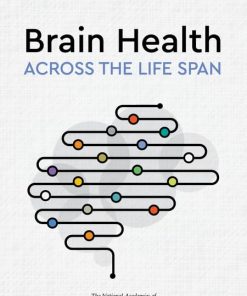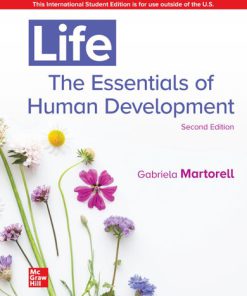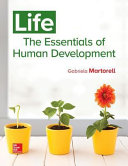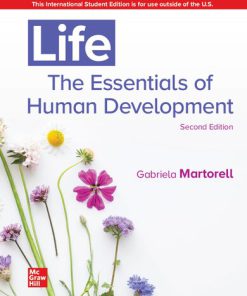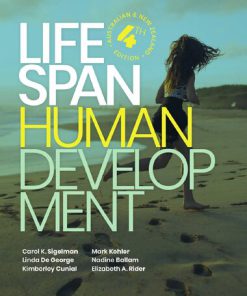Essentials of Human Development A Life Span View 2nd Edition by Robert V Kail, John C Cavanaugh ISBN 9781305856363 1305856368
$50.00 Original price was: $50.00.$25.00Current price is: $25.00.
Essentials of Human Development A Life Span View 2nd Edition by Robert V Kail, John C Cavanaugh – Ebook PDF Instant Download/Delivery: 9781305856363 ,1305856368
Full download Essentials of Human Development A Life Span View 2nd Edition after payment

Product details:
ISBN 10: 1305856368
ISBN 13: 9781305856363
Author: Robert V Kail, John C Cavanaugh
Essentials of Human Development A Life Span View 2nd Edition Table of contents:
1. The Study of Human Development
1.1. Thinking About Development
Recurring Issues in Human Development
Basic Forces in Human Development: The Biopsychosocial Framework
Neuroscience: A Window Into Human Development
1.2. Developmental Theories
Psychodynamic Theory
Learning Theory
Cognitive-Developmental Theory
Ecological and Systems Perspective
Lifelong Development Perspective
The Big Picture
1.3. Doing Developmental Research
Measurement in Human Development Research
General Designs for Research
Designs for Studying Development
Conducting Research Ethically
Communicating Research Results
Applying Research Results: Social Policy
Problems with Using Photographs to Measure Understanding of Emotions
Summary
Key Terms
Part 1. Prenatal Development, Infancy, and Early Childhood
2. Biological Foundations
2.1. In the Beginning: 23 Pairs of Chromosomes
Mechanisms of Heredity
Heredity, Environment, and Development
2.2. From Conception to Birth
Period of the Zygote (Weeks 1 and 2)
Period of the Embryo (Weeks 3–8)
Period of the Fetus (Weeks 9–38)
2.3. Influences on Prenatal Development
General Risk Factors
Teratogens: Drugs, Diseases, and Environmental Hazards
How Teratogens Influence Prenatal Development
Prenatal Diagnosis and Treatment
2.4. Labor and Delivery
Stages of Labor and Delivery
Approaches to Childbirth
Adjusting to Parenthood
Birth Complications
Infant Mortality
Summary
Key Terms
3. Tools for Exploring the World
3.1. The Newborn
The Newborn’s Reflexes
Assessing the Newborn
The Newborn’s States
Temperament
3.2. Physical Development
Growth of the Body
The Emerging Nervous System
3.3. Moving and Grasping: Early Motor Skills
Locomotion
Fine Motor Skills
3.4. Coming to Know the World: Perception
Smelling, Tasting, Touching, and Hearing
Seeing
Integrating Sensory Information
3.5. Becoming Self-Aware
Origins of Self-Concept
Theory of Mind
Summary
Key Terms
4. The Emergence of Thought and Language
4.1. The Onset of Thinking: Piaget’s Account
Basic Principles of Cognitive Development
Sensorimotor Thinking
Preoperational Thinking
Evaluating Piaget’s Theory
Extending Piaget’s Account: Children’s Naive Theories
4.2. Information Processing During Infancy and Early Childhood
General Principles of Information Processing
Attention
Learning
Memory
Learning Number Skills
4.3. Mind and Culture: Vygotsky’s Theory
The Zone of Proximal Development
Scaffolding
Private Speech
4.4. Language
The Road to Speech
First Words and Many More
Speaking in Sentences: Grammatical Development
Communicating with Others
Summary
Key Terms
5. Entering The Social World
5.1. Beginnings: Trust and Attachment
Erikson’s Stages of Early Psychosocial Development
The Growth of Attachment
What Determines Quality of Attachment?
5.2. Emerging Emotions
Experiencing and Expressing Emotions
Recognizing and Using Others’ Emotions
Regulating Emotions
5.3. Interacting with Others
The Joys of Play
Helping Others
5.4. Gender Roles and Gender Identity
Images of Men and Women: Facts and Fantasy
Gender Typing
Gender Identity
Evolving Gender Roles
Summary
Key Terms
Part 2. School-Age Children and Adolescents
6. Off To School
6.1. Cognitive Development
More Sophisticated Thinking: Piaget’s Version
Information-Processing Strategies for Learning and Remembering
6.2. Aptitudes for School
Theories of Intelligence
The Development of Intelligence Testing
Do Tests Work?
Hereditary and Environmental Factors
The Impact of Ethnicity and Socioeconomic Status
6.3. Special Children, Special Needs
Gifted Children
Children with Disability
Attention-Deficit Hyperactivity Disorder
6.4. Academic Skills
Reading
Writing
Math Skills
Effective Schools, Effective Teachers
6.5. Physical Development
Growth
Development of Motor Skills
Physical Fitness
Participating in Sports
Summary
Key Terms
7. Expanding Social Horizons
7.1. Family Relationships
Dimensions and Styles of Parenting
Siblings
Divorce and Remarriage
Parent–Child Relationships Gone Awry: Child Maltreatment
7.2. Peers
Friendships
Groups
Popularity and Rejection
Aggressive Children and Their Victims
7.3. Electronic Media
Television
Computers
7.4. Understanding Others
Describing Others
Understanding What Others Think
Prejudice
Summary
Key Terms
8. Rites of Passage
8.1. Pubertal Changes
Signs of Physical Maturation
Mechanisms of Maturation
Psychological Impact of Puberty
8.2. Health
Nutrition
Physical Fitness
Threats to Adolescent Well-Being
8.3. Information Processing During Adolescence
Working Memory and Processing Speed
Content Knowledge, Strategies, and Metacognitive Skill
Problem Solving and Reasoning
8.4. Reasoning About Moral Issues
Kohlberg’s Theory of Moral Reasoning
Beyond Kohlberg’s Theory
Summary
Key Terms
9. Moving Into the Adult Social World
9.1. Identity and Self-Esteem
The Search for Identity
Ethnic Identity
Self-Esteem in Adolescence
9.2. Romantic Relationships and Sexuality
Romantic Relationships
Sexual Behavior
Sexual Orientation
Dating Violence
9.3. The World of Work
Career Development
Part-Time Employment
9.4. The Dark Side
Drug Use
Depression
Delinquency
Summary
Key Terms
Part 3. Young and Middle Adulthood
10. Becoming an Adult
10.1. Emerging Adulthood
Role Transitions Marking Adulthood
Going to College
Behavioral Changes
Launching Financial Independence
10.2. Physical Development and Health
Growth, Strength, and Physical Functioning
Health Status
Lifestyle Factors
Social, Gender, and Ethnic Issues in Health
10.3. Cognitive Development
How Should We View Intelligence in Adults?
Primary and Secondary Mental Abilities
Fluid and Crystallized Intelligence
Neuroscience Research and Intelligence in Young and Middle Adulthood
Going Beyond Formal Operations: Thinking in Adulthood
Integrating Emotion and Logic in Life Problems
10.4. Who Do You Want to Be? Personality in Young Adulthood
Creating Scenarios and Life Stories
Possible Selves
Personal Control Beliefs
Summary
Key Terms
11. Being With Others
11.1. Relationships
Friendships
Love Relationships
Violence in Relationships
11.2. Lifestyles
Singlehood
Cohabitation
Gay and Lesbian Couples
Marriage
11.3. The Family Life Cycle
Deciding Whether to Have Children
The Parental Role
11.4. Divorce and Remarriage
Divorce
Remarriage
Summary
Key Terms
12. Work
12.1. Occupational Selection and Development
The Meaning of Work
Occupational Choice and Career Development
Occupational Expectations
Job Satisfaction
12.2. Gender, Ethnicity, and Discrimination Issues
Gender and Ethnic Differences in Occupational Selection and Development
Bias and Discrimination
12.3. Occupational Transitions
Retraining Workers
Occupational Insecurity
Coping with Unemployment
12.4. Work and Family
The Dependent Care Dilemma
Juggling Multiple Roles
Summary
Key Terms
13. Making It in Midlife
13.1. Physical Changes and Health
Changes in Appearance
Changes in Bones and Joints
Reproductive Changes
Stress and Health
Exercise
13.2. Cognitive Development
Practical Intelligence
Becoming an Expert
Lifelong Learning
13.3. Personality
The Five-Factor Trait Model
Changing Priorities in Midlife
13.4. Family Dynamics and Middle Age
Letting Go: Middle-Aged Adults and Their Children
Giving Back: Middle-Aged Adults and Their Aging Parents
Grandparenthood
Summary
Key Terms
Part 4. Late Adulthood
14. The Personal Context of Later Life
14.1. What Are Older Adults Like?
The Demographics of Aging
Longevity
14.2. Physical Changes and Health
Biological Theories of Aging
Physiological Changes
Chronic Disease and Health Issues
14.3. Cognitive Processes
Information Processing
Memory
Creativity and Wisdom
14.4. Mental Health and Intervention
Depression
Dementia
Summary
Key Terms
15. Social Aspects of Later Life
15.1. Theories of Psychosocial Aging
Social Involvement and Successful Aging
Competence and Environmental Press
15.2. Personality, Social Cognition, and Spirituality
Integrity Versus Despair
Well-Being and Emotion
Spirituality in Later Life
15.3. I Used to Work at …: Living in Retirement
What Does Being Retired Mean?
Why Do People Retire?
Adjustment to Retirement
Employment and Volunteering
15.4. Friends and Family in Late Life
Friends, Siblings, and Socioemotional Selectivity
Marriage and Same-Sex Partnerships
Caring for a Partner
Widowhood
15.5. Social Issues and Aging
Frail Older Adults
Housing Options
Elder Abuse and Neglect
Social Security and Medicare
Summary
Key Terms
16. The Final Passage
16.1. Definitions and Ethical Issues
Sociocultural Definitions of Death
Legal and Medical Definitions
Ethical Issues
16.2. Thinking About Death: Personal Aspects
A Life-Course Approach to Dying
Dealing with One’s Own Death
Death Anxiety
16.3. End-of-Life Issues
Creating a Final Scenario
The Hospice Option
Making Your End-of-Life Intentions Known
16.4. Surviving the Loss: The Grieving Process
The Grief Process
Typical Grief Reactions
Coping with Grief
Complicated or Prolonged Grief Disorder
16.5. Dying and Bereavement Experiences Across the Life Span
Childhood
Adolescence
Adulthood
Late Adulthood
Conclusion
Summary
Key Terms
People also search for Essentials of Human Development A Life Span View 2nd Edition:
life essentials of human development
fundamentals of nutrition and human development meaning in hindi
major principles of human development
fundamentals of human development pdf
fundamentals of nutrition and human development pdf
Tags: Robert V Kail, John C Cavanaugh, Human Development, Life Span View
You may also like…
Psychology - Developmental Psychology
Life: The Essentials of Human Development Gabriela Martorell
Psychology - Social Psychology
Life-Span Development, 19th Edition by John W. Santrock 9781266769115 1266769110
Education Studies & Teaching
Science (General) - Theories of Science
Life The Essentials of Human Development 1st Edition Gabriela Martorell
Politics & Philosophy - Social Sciences
Psychology - Developmental Psychology
Loose Leaf for Essentials of Life-Span Development 7th Edition John W. Santrock



